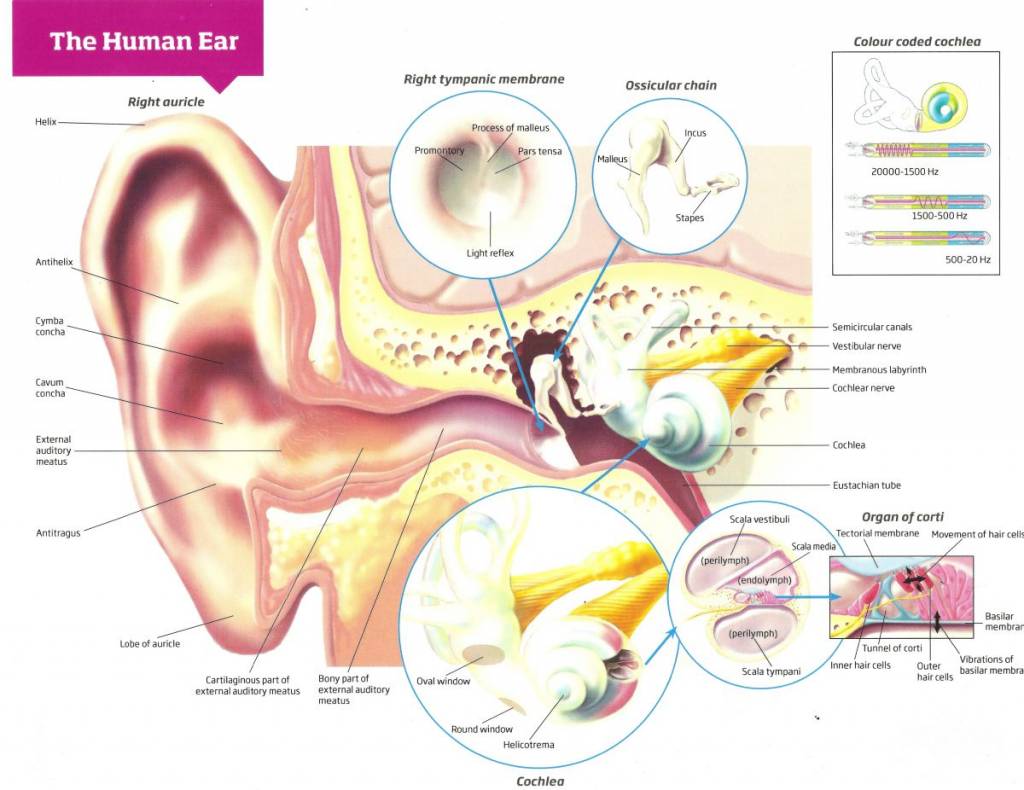
11 Aug Why Aren’t My Hearing Aids Perfect!?!
While the majority of hearing aid users are quite satisfied with the performance of their hearing aids, there are some individuals that struggle to understand what to expect from their hearing device. Hearing aids serve to amplify an individual’s residual hearing, therefore the performance of any particular hearing aid is dictated by that individual’s hearing loss.
Hearing loss can originate from several areas along the auditory pathway including the middle ear, inner ear or auditory nerve. The middle and inner ear are the source of the majority of problems, with less than 1% of hearing loss originating from neural involvement. A hearing loss originating in the middle ear is often caused by a physical anomaly, ranging from anywhere to fluid in the ear to a fixation of the tiny bones in the ear that translate sound. We refer to this type of loss as a mechanical problem, which can often be remediated with medical treatment. In the event that medical treatment is not an option, individuals with conductive hearing loss do quite well with hearing aids since the primary problem is simply amplification of the sound to overcome the diminished hearing caused by the source of the conductive hearing loss. Once the sound has been amplified it is delivered to a normal functioning hearing organ, the cochlea, in the inner ear which can then normally process sound.
The majority of age and noise related hearing loss originates in the inner ear and is referred to as a sensory hearing loss. Individuals with this type of hearing loss have sustained damage to the tiny hair cells in their cochlea that are responsible for amplification and the acuity of sounds. In the case of a sensory hearing loss, there are often two separate components of the hearing loss that dictate an individual’s success with hearing aids. First of all, like conductive hearing loss, the hearing impaired individual hears sounds at a reduced level. However, unlike a conductive hearing loss, many of these individuals also struggle to hear even amplified sounds clearly. The damage in the inner ear can result in a clarity issue for many individuals. If this is the case it is something that should be thoroughly explained by your audiologist to help you better understand how you can expect your hearing aids to perform.
An audiological test battery will measure your speech discrimination ability by administering several tests. Word Recognition Scores are one such measure that are obtained at an elevated listening level that provides the extra volume dictated for your hearing loss. During this test your examiner will have you repeat a list of words, and based on your response will provide a percentage score that reflects your ability to discriminate isolated words under quiet conditions, thereby providing an indication of how clearly you are able to interpret speech under ideal conditions. Another test commonly utilized is the Speech in Noise (SIN) test whereby you are asked to repeat sentences in the presence of babbling background noise. This test gives a more accurate perception of how well an individual hears in noisy real world listening situations.
Individual’s with sensory, or inner ear, hearing loss will vary dramatically in their ability to discriminate speech. Not only do the acuity amplifiers in the inner ear play a role in this process but central processing centers in the brain also contribute to such discrimination. To better understand this phenomenon it helps to think of the ear as the ‘avenue’ for sound that delivers a message to the brain for processing and understanding. Sound enters the outer ear, travels through the structures in the middle ear where it reaches the cochlea in the inner ear, there it is processed, and then it travels up the auditory nerve to the brain and is perceived. Like our legs are our ‘avenue’ for walking, if there is anything that impairs the ear’s ability to perform this task the desired outcome can be adversely affected. Therefore, if there is hearing loss is accompanied by speech processing difficulty the brain will receive a degraded message, which can therefore lead to misrepresentation of sounds and hence misinterpreting of what has been said. Furthermore, if an individual has had untreated hearing loss for some period of time, the auditory pathway can also become degraded due to lack of sensory stimulation. As a result of receiving insufficient or degraded messages over time the auditory processing center in the brain can become less effective in processing and understanding the information received. It would be similar to an individual with reduced mobility in their legs trying to walk again without the proper rehabilitation. If you don’t use it you are more at risk to lose it.
Now that we have established how hearing loss can differ, it should be easier to understand why one individual’s experience with hearing aids can dramatically differ from another’s. First of all the type of hearing loss being treated can have an impact, furthermore the individual’s ability to process and distinguish speech is essential in determining hearing aid performance. The sooner an individual with hearing loss receives amplification that will help remediate their hearing levels, the better that individual will do in the long run. The longer a hearing loss goes untreated the longer the period of sensory deprivation whereby the auditory pathway and the brain are not properly exercised. Without this sensory stimulation the individual is at greater risk of developing speech discrimination problems.
In the rare case of true neural hearing loss speech processing abilities can also be severely impaired affecting hearing aid benefit and performance. Nonetheless there are many successful hearing aid users with poor speech discrimination abilities. When receiving a hearing evaluation it is paramount that the audiologist explain the etiology of your specific hearing loss in order to help you understand the source of the problem and further implications. With proper counseling, fitting expertise, and continued support almost all individuals can be happy hearing aid users.

